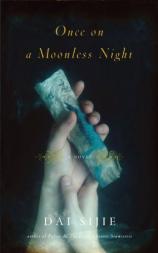Reading Group Guide
Discussion Questions
Once on a Moonless Night

1. What is this book about? What are Dai's major themes?
2. Who is the narrator? What do we know about her? Do you like her?
3. On pages 31-32, Professor Tang Li describes Puyi's fascination with an ancient language made up purely of nouns: “No verbs, therefore no concerns.” What does this mean? Why did Puyi conflate verbs with concerns?
4. Discuss the role of language itself throughout the novel. Why does it hold such power for Paul d'Ampère? For Tumchooq? For the narrator?
5. The narrator states that filial love “lies at the heart of the Chinese moral code” (p. 59). Why is this significant?
6. How does the murder of White-Tuft change the course of the novel?
7. Why does Tumchooq tell the story of Mr. Liu (pp. 82-85)? What message is he trying to convey to the narrator? Why is Mr. Liu so important to him?
8. Discuss the incident with Ma at the Exhibition of Ancient Chinese Punishments and Tortures. Why did Tumchooq do what he did? And why does he tell the story the way he does? What does this scene say about truth and deception?
9. Is there such a thing as a true friend in this novel? What about Hu Feng?
10. How are women treated in the novel? Why aren't the narrator and Tumchooq's mother identified by name?
11. Is Tumchooq like his father? In what ways?
12. Why does Paul d'Ampère turn his back on France? Does the narrator? How does pride of country affect the events in the novel?
13. Reread Tumchooq's letter on page 175. Why does his father's death affect him so deeply?
14. Discuss the notion of choice. How does Dai distinguish “choice” from “decision”?
15. On pages 197-198, Mr. Tarakesa tells the narrator that d'Ampère couldn't find the scroll because he was a Westerner, that “finding the end of a teaching like that requires an entirely oriental mind.” Why is the narrator so taken aback? Where else does bigotry come into play? In this novel, does it work both ways?
16. Do you agree with the narrator's assertion, on page 202, that “in literature there is just one true masterpiece to which different writers give a particular form”? Do you think Dai agrees?
17. What is signified by d'Ampère's blank headstone? Do you agree with Tumchooq's interpretation on page 230?
18. Discuss the epilogue. What does it mean that Peking has changed so thoroughly?
19. What did you think of the revelation about Tumchooq's mother, on pages 268-69?
20. Reread the end of the sutra, the last lines of the novel. What is the significance?
21. Did the ending satisfy you? Why or why not?
Suggested Reading
The Travels of Marco Polo; Fortress Besieged by Qian Zhongshu; One Hundred Years of Solitude by Gabriel García Márquez; The Catcher in the Rye by J. D. Salinger; Heart of Darkness by Joseph Conrad; The Gulag Archipelago by Aleksandr Solzhenitsyn.
Once on a Moonless Night
- Publication Date: August 11, 2009
- Genres: Fiction
- Hardcover: 288 pages
- Publisher: Knopf
- ISBN-10: 0307271587
- ISBN-13: 9780307271587







